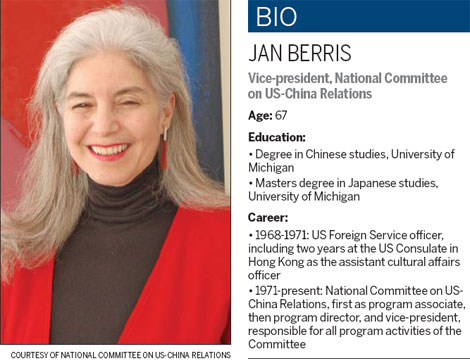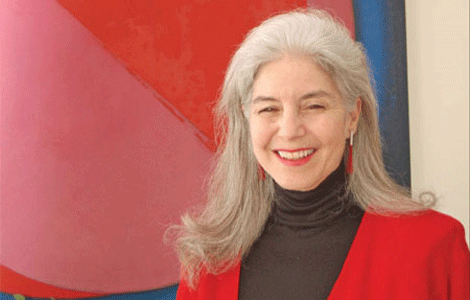Top News
China at her fingertips
Updated: 2011-09-02 09:04
By Chen Weihua (China Daily European Weekly)

Veteran US-China relations expert says bilateral ties have withstood the test of time
In a room full of China hands such as Winston Lord, Richard Solomon and Kenneth Lieberthal, no one disputes the fact that Jan Berris probably knows more Chinese than any other American involved in bilateral relations between the two nations.
Berris has not only shaken hands with almost every single Chinese leader since Premier Zhou Enlai and received several hundred Chinese delegations to the United States; she has at the same time overseen the visits of several hundred delegations to China and made over 100 visits herself to the Middle Kingdom.
It all started in 1971, when 27-year-old Berris took a year's leave of absence from the US Foreign Service to help out at the National Committee on United States-China Relations (NCUSCR). Little did she know that the journey would last over 40 years and still continue to this day.
Five months before she arrived at the committee in 1971, the US table-tennis team was invited to visit China. The news surprised then US president Richard Nixon and his assistant for National Security Affairs Henry Kissinger who were later to embark on their historic trip to China in 1972.
Berris' first job at the NCUSCR, an NGO set up in 1966 and dedicated to promoting understanding between the two nations, was to prepare for a return visit in April 1972 by the Chinese table-tennis team. It would also be the first delegation from the People's Republic of China ever to set foot on US soil in what was later termed ping-pong diplomacy.
Berris' work on the program impressed everyone including Zhuang Zedong, the head of the Chinese delegation and a former world table-tennis champion, who wanted her to be part of the NCUSCR delegation that was slated to visit China at the year's end.
Though she got permission from the Foreign Service to extend her leave for another year, Berris was not part of the first delegation that visited China. She had to stay on in the US to welcome the Shenyang Acrobatic Troupe, as part of the first performing arts exchange program between the US and China.
Buoyed by her efforts, Berris decided to extend her leave for a third year, a rarity in the Foreign Service. "I told them: Just look at the experience I had. I personally know more Chinese than the entire US government put together," Berris recalls.
"You're right," was the reply. She finally got a leave of absence for four years. "At this stage of my career, not only did I love my job, but also New York," she says.
In June 1973, Berris made her first trip to China with the second NCUSCR board group. "It was very different and very calm then," reminisces Berris of her sojourn in Beijing. "I remember vividly that Michael Oksenberg (a China hand) and I, who were co-secretary-generals for the group, were having an argument in the middle of Chang'an Avenue outside the Minzu Hotel. We were arguing in the middle of the street for over 20 minutes and the only things that were going by were bicycles and some donkey carts," she says.
She still has fond and vivid memories from that first trip.
"During the meeting with the board delegation, Premier Zhou Enlai stated that 'China does not have any troops stationed on foreign soil unlike the US and other nations. China is not an aggressor nation and China would never be the first one to attack any other country'," recalls Berris, who is known to many in China by her Chinese name, Bai Lijuan.
"Zhou then said, 'I solemnly pledge that after I'm gone, if China ever invades another country, I want the youngest member of this delegation, Bai Lijuan, to stand up and publicly say that Premier Zhou Enlai told her that she should criticize China if China ever does that'."
Before the meeting, a group photo was taken in front of a huge screen in the Great Hall of the People. Zhou Enlai turned to Berris and said, "I understand you're a China specialist, so I wonder if you can tell us what the sign behind you says."
Having not looked at the screen and not read anything in Chinese for more than six years, Berris, who called herself the youngest and least important member of the delegation, thought she was going to be embarrassed.
She turned around and looked at the sign and luckily knew what it was. "Yes, that's the welcoming pine - ying ke song," Berris said.
Zhou was impressed, so was everyone else in the delegation. Berris, however, did not tell them that Qiao Guanhua, the deputy foreign minister then, had explained this to her and some others during a dinner the previous night at a restaurant, where the same picture was hung on the wall.
Berris described Zhou as one of the few people in the world that she feels had enormous charisma.
She also heaped praise on former premier Zhu Rongji, who, as Shanghai mayor, led a Chinese mayor delegation to the US in 1991, a difficult year for US-China relations. "Zhu was extremely, extremely impressive. He was the first Chinese leader I've ever seen to give a speech without notes. And he didn't shy away from sensitive topics," Berris says.
Born into a Jewish family in 1944, Berris grew up in Detroit in the 1950s and 60s, when the city was still a pleasant place with a good racial mix. She attended the University of Michigan at Ann Arbor, studying first about China and then Japan.
"My interest in China was formed from my interest in Asia and reading Chinese history. The image most Americans then had about China was from Pearl S. Buck's novel Good Earth. So I was predisposed to be positive about China," Berris says.
She believes the ping-pong team members, the acrobatic troupe and other delegations all helped form her attitude towards China. "They are wonderful, friendly, warm and open," she says.
At the NCUSCR, Berris runs many programs like the student leaders' exchange, US foreign policy colloquium, exchange of environmental law professionals, China Town Hall and Sino-American dialogue on the rule of law and human rights. But what is relatively unknown is that the center has a staff of less than 15. Many who pass the office on West 23rd Street, in Manhattan, believe that the entire 19-story building belongs to the committee, but very few know that we occupy just an office condo unit in the building.
"We are lucky to have someone like Berris who is available round the clock. She counts for another 15," says Steve Orlins, president of NCUSCR.
As vice-president of NCUSCR, Berris' small office is often the center for visitors and colleagues alike. Piles of documents are stacked everywhere in her office, jokingly described by her colleagues as sophisticated vertical filing, showcasing the amount of work she has been handling.
"Whether it's a picnic for Chinese friends in Washington, or the Young Leaders Forum, or the luncheon for the premier or dinner for the Chinese president or housing visiting Chinese students or accompanying delegates going to China and leading them around, Berris makes it happen on time, within budget and with a smile," says Carla Hills, chairman of the NCUSCR board and former US trade representative.
Hills credited Berris for helping the NCUSCR become the institution it is today while launching the Jan Berris Program Fund a few months back.
A clearly excited silver-haired Berris describes her past 40 years of work as something that "couldn't have been better even if I had designed it myself".
"My love for the people has sustained me all these years in the committee," she says.
E-paper

Unveiling hidden treasures
The Forbidden City, after the Great Wall, is the most recognized tourist site in China.
Short and sweet
Game for growth
Character reference
Specials

China at her fingertips
Veteran US-China relations expert says bilateral ties have withstood the test of time

The myth buster
An outsider's look at china's leaders is updated and expanded

China in vogue
How Country captured the fascination of the world's most powerful fashion player
